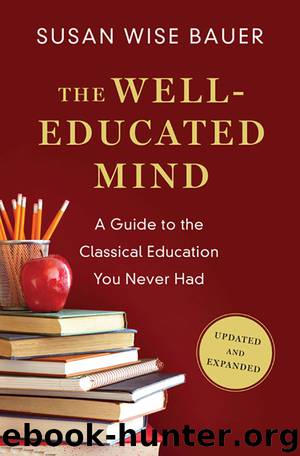The Well-Educated Mind by Bauer Susan Wise

Author:Bauer, Susan Wise
Language: eng
Format: epub
Publisher: W. W. Norton & Company
Published: 2015-11-15T16:00:00+00:00
THE PURPOSE OF DRAMA (OR, WHY BUY A TICKET?)
In 1959, the dramatist Harold Habson—faced with plays full of symbols and absurdities—wrote indignantly, “It is time someone reminded our advanced dramatists that the principal function of the theater is to give pleasure. . . . It is the duty of the theater, not to make men better, but to render them harmlessly happy.”12
The debate about what theater ought to do has continued ever since. “Serious” theater—whether realistic or not—has continued to attract a sizable audience, but since Restoration times and the elimination of cheap tickets for groundlings, “popular” and “serious” theater (read “entertainment” and “exploration of ideas”) have continued to diverge. Brecht and his followers stripped the stage and sent actors out into the audience. But the “popular” theater developed a quite different form: melodrama, which sold hundreds of thousands more tickets than the serious theater. In melodrama, good and evil were clearly defined, and the villain got what he deserved while the audience cheered. The melodrama, with its affirmations of married love, patriotism, motherly affection, and the dangers of debt, gambling, and drinking, was what most people saw while the intellectuals were attending performances of No Exit. In America, Uncle Tom’s Cabin became one of the most successful melodramas ever, with over five hundred touring companies presenting it (“Many actors spent their entire professional lives playing in Uncle Tom,” remarks Daniel Gerould).13 Under the Gaslight introduced audiences to London poverty and ended with the poor working girl rescuing a bound victim (a one-armed veteran) from the path of an oncoming train (an image which became emblematic of the melodrama).
Melodrama was entertainment, but it also represented a third path toward truth; as Peter Brooks writes in his well-known study The Melodramatic Imagination, melodrama was born in a time of “radical freedom,” when audiences needed “the promise of a morally legible universe to those willing to read and interpret properly its signs.” Realistic drama claimed that human beings could find truth in careful psychological portraits, making the mind the place where connections between people are possible; nonrealistic drama claimed that no connections between people are possible at all; melodrama asserted that ultimate good and evil exist, and that “even when facing an abyss, man may choose to believe in good and evil.”14 Melodrama is no longer performed today, but that’s not because no one believes in good and evil anymore; the function of melodrama has shifted to the summer blockbuster movie with its good guys, bad guys, and victorious endings.
Serious theater, battling both the movies and Cats for spectators, remains perpetually in crisis. At its best, a serious play provides what Peter Brook calls the “Holy Theatre”—a place where the audience can see “the face of the invisible through an experience on the stage that transcended their experience in life. They will maintain that Oedipus or . . . Hamlet or The Three Sisters performed with beauty and with love fires the spirit and gives them a reminder that daily drabness is not necessarily all.
Download
This site does not store any files on its server. We only index and link to content provided by other sites. Please contact the content providers to delete copyright contents if any and email us, we'll remove relevant links or contents immediately.
| Booksellers & Bookselling | General |
| History of Books |
4 3 2 1: A Novel by Paul Auster(12392)
The handmaid's tale by Margaret Atwood(7763)
Giovanni's Room by James Baldwin(7346)
Asking the Right Questions: A Guide to Critical Thinking by M. Neil Browne & Stuart M. Keeley(5775)
Big Magic: Creative Living Beyond Fear by Elizabeth Gilbert(5771)
Ego Is the Enemy by Ryan Holiday(5448)
The Body: A Guide for Occupants by Bill Bryson(5096)
On Writing A Memoir of the Craft by Stephen King(4943)
Ken Follett - World without end by Ken Follett(4731)
Adulting by Kelly Williams Brown(4574)
Bluets by Maggie Nelson(4556)
Eat That Frog! by Brian Tracy(4540)
Guilty Pleasures by Laurell K Hamilton(4449)
The Poetry of Pablo Neruda by Pablo Neruda(4106)
Alive: The Story of the Andes Survivors by Piers Paul Read(4031)
White Noise - A Novel by Don DeLillo(4009)
Fingerprints of the Gods by Graham Hancock(4004)
The Book of Joy by Dalai Lama(3986)
The Bookshop by Penelope Fitzgerald(3853)
